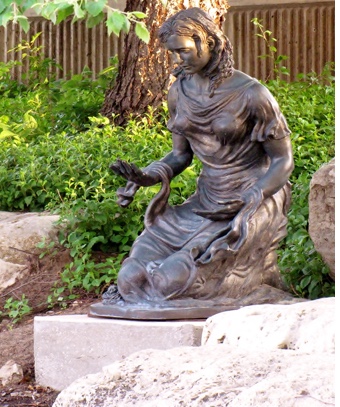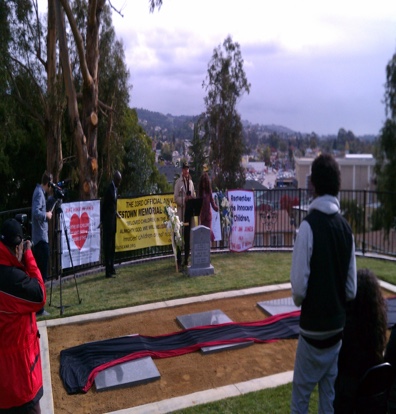The People of long ago are not remembered,
nor will there be any remembrance
of people yet to come
by those who come after them. Eccl 1:11, NIB.

Bronze Sculpture by S.L Jonson
Rachel refuses to be consoled. What a haunting thought! But wait, there is something else. Perhaps, she knows the truth embodied in Eccl. 1:11 of life’s endless repetition and historical amnesia.
The Hebrew term for “not remembered” is zichron. The Hebrew root term is ZKR. The phrase may be translated as “There is no memory of earlier ones.”
“Earlier ones” may also be victims. I think of the victims of Jonestown who are buried in a mass grave in Oakland’s Evergreen Cemetery. Many were unidentified and hence unknown; a few were once known, but their bodies were unclaimed, and now they are unknown as well.
I also think about the victims of the Nazi-perpetrated Holocaust buried in mass graves, the vaporized victims of the US atomic bombs dropped on Hiroshima and Nagasaki, the “killing fields” of Cambodia’s Khmer Rouge Communist regime, and all others – children, women, men – over the centuries who tragically lost their lives. Haunting is the cruelty that humans do to humans and the rest of creation! Vanity of vanities!
II

Photo by author
The year 2017 marks the 39th anniversary of the deaths in Jonestown. The anniversary also brings us the first year of the presidency of Donald Trump. This too is a haunting situation that many could not have envisioned a few years ago. Mr. Trump came to the presidency with no prior political experience. I doubt that an ethnic minority person lacking in political experience and with demonstrated behavior similar to Mr. Trump’s could ever be elected president. As a candidate, he drew upon a base of appeal that was strong, hateful and fearful enough for him to win. Since his election, the Southern Poverty Law Center and the Pew Foundation report that hate groups, hate crimes and general distrust of others have increased. This is a form of audience corruption in a democracy where haunting behaviors, distrust and other negative effects increases and becomes normative.
Is this the idealized society and hope-filled democracy envisioned over 40 years ago by Pastor Jim Jones? Are these the results that the residents of Jonestown worked for? Perhaps there are deeper and ontological questions to investigate. Perhaps these questions are too big and need context and greater nuancing.
- When do we ever learn lessons from the past and from the greatest teacher of all, experience?!
- What do we learn?
- When do we stop pointing the finger of blame at others and take stock of our own selves, recognize our limits, and face our possibilities as human beings?
- Can we ever move beyond blaming someone else; or on the other hand, assuming all of the blame, guilt and wrong doing ourselves?
The far greater challenge is a mature, confessional and forgiving one, a moving ahead with a sense of balance, wisdom and courage, fair play and integrity, a moral and ethical responsibility with love and empathy, power and justice for finite, human conditions. If mature self-awareness balanced with self-giving love is the summon bonum, then how do we wrestle beneficial lessons from our varied and complex, rich and very human experiences – over time?
Learning from this kind of wrestling (with the angels?) and critical reflection is not often our quest. It is hardly our achievement. The fourth-century monk Saint Augustine wrote in his autobiography: “[People] go abroad to wonder at the heights of mountains, at the huge waves of the sea, at the long courses of the rivers, at the vast compass of the ocean, at the circular motions of the stars, and they pass by themselves without wondering” [The Confessions, 397-400AD, pp. 42-3]. Augustine was pointing to something familiar and repetitive, namely our limited self-awareness and partial view of things. Should limited self-awareness and an incomplete view of things also be listed among the vanities?
III
Limited self-awareness and partial view of things or ideological blindness. During the summer and early fall of 2016, I travelled to London and the Tuscany area of Italy. I heard or read haunting charges in the media as such “crooked Hillary,” “lock her up,” “liar,” “fake news,” “rigged electoral system”, “alternatives facts,” “build a wall along the Mexico border to keep the criminals and other bad hombres out,” etc.
Hillary Clinton stuck to her experiences as a leader in the United Methodist Church, politician, Secretary of State, and First Lady. She admitted to mistakes, showed flexibility, interpreted facts as she understood them, and provided back-up data. Her opponent did none of that. Throughout the campaign, Donald Trump used the populist language of certain demagogues such as Andrew Jackson, George Wallace or Silvio Berlusconi. He promised to restore American society to “greatness” again.
We could have asked of both candidates (and ourselves), “Were these partial views parading as whole truths?” For Donald Trump, truth, logic and evidence were often at variance with reality. To the shock and dismay of many, he merely repeated over and again, “It’s true.” He provided no evidence, demonized a few, denounced others and ridiculed anyone who spoke against him. But he won the election. This was especially bewildering because the majority of those who voted did so for Hillary Clinton. This included African-Americans, Muslim Americans, Latinos, immigrants as well as certain educated white Americans. How then was the appeal of a Donald Trump to be explained in a so-called “post-racial” and democratic society after Jonestown? What did voting Americans hear about the candidates, I wondered?
Last year, I asked if one could make a case that there is a parallel between Jim Jones and Donald Trump. I now believe there is clear evidence that such a parallel can be made. I also fear that the danger that Mr. Trump represents to the world may be much bigger and longer lasting. But his supporters – his audience – continue to seem clueless about any of this, and instead cheer each pronouncement of their leader, just as the followers of Jim Jones once cheered each pronouncement from the pulpit. Jeet Heer, senior editor of New Republic Magazine argued that Trump’s real appeal was based on racism. One could say something similar about Jim Jones’ appeal, but with a twist of emphasis.
What was being suppressed or going on behind the scene that many (including myself) did not know about? Questions abound. What was or is the connection with Russia? What is in those tax returns that he refuses to disclose? What about state-sanctioned violence against Black people, his fraud and deception, his debt and failed business ventures such as Trump University, his nepotism, his sexism. The American people have been successfully distracted by the politics of distraction, obfuscation, disinformation, and fake news.
The essential point is this: Trump is uniquely unqualified to be president. As many political writers and thinkers have noted, his grasp of issues has been rudimentary, at best. And something very similar could be stated about James Warren Jones. He was in way over his head from the beginning. He was uniquely unqualified to be a disciplined Christian pastor who truly cared about being an inspiring leader for democratic values, the spiritual, moral life and integrity of his people.
IV
Self-reflection and vanity of vanities. Our individual capacity to reach out, serve, and care is limited. It is augmented in variety when it is part of a community-for-others. Still, life is haunted by endless – and often violent – repetition. The depth of Rachel’s devastating loss is unknown by those whose loss at Jonestown was great. “We don’t remember what happened in the past, and in future generations, no one will remember what we are doing now” (Ecclesiastes 1:11, New Living Translation). Perhaps, Rachel is on to something endemic to human conditions when she refuses to be consoled. Perhaps, she knows the truth embodied in Eccl. 1:11 of life’s endless repetition and historical amnesia.
Today, Donald Trump is president of the United States. Political chaos, instability, lies, lies and more damn lies, and diminishing trust continues to characterize his administration after almost a year into his presidency. What self-understandings do we derive when we look back 39 years ago to Jonestown, Guyana?
Do we ever gain wisdom, remember or learn from the people of long ago? Perhaps, the one thing that we learn is that we seem to never learn. This seems to be especially true in those times when we appear to be going backwards. When we repeat the same or similar mistakes of previous generations, we may believe that what is happening is “new.” Rape and murder, a sense of insecurity and anxiety, anger and fear, hate and exploitation, distraction and deception, appear to be ancient, primitive, long ago, and yet ongoing themes in our everyday and very human condition. These themes continue to find new forms of expression. Are we left with the haunting thought that all human toil is vanity? Or is there something more?
(Rev. Archie Smith, Jr., Ph.D. is a regular contributor to this website. His complete collection of writings is here.)